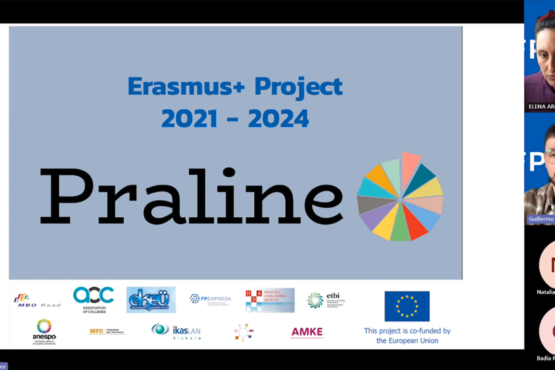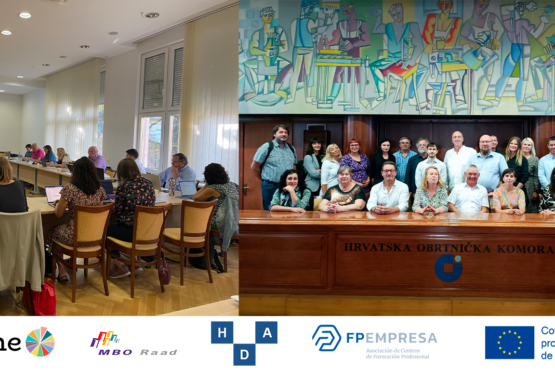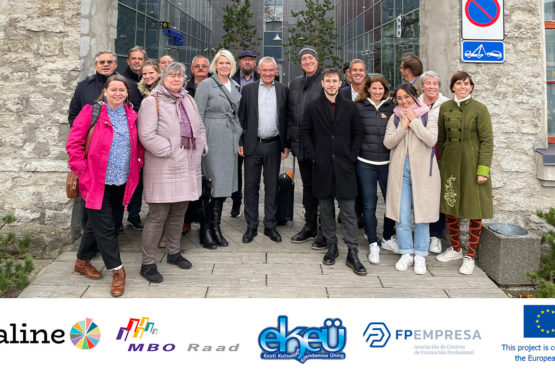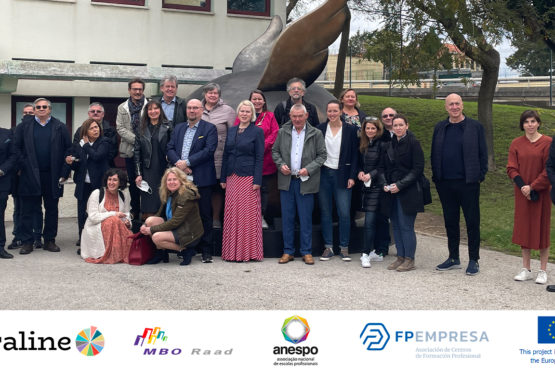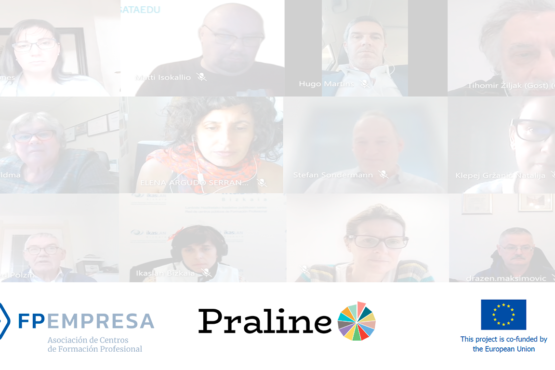The Asociación de Centros de Formación Profesional FPEmpresa has held an online session to disseminate the results of the PRALINE project with its affiliated centers. Following the closing session in Rotterdam (Netherlands) in December 2023, FPEmpresa’s International Project Technician, Guillermo Gonzálbez, has led the meeting and has shared project materials with attendees on Tuesday, January 9, 2024. Gonzálbez has explained that “the Association is expanding more and more internationally. Proof of this is the projects and contacts being carried out in different countries, such as Thailand.”
Throughout the presentation, Elena Argudo, Project Director at FPEmpresa, has stated “the work of the European project strengthening transnational networks of Vocational Training through mutual learning, peer counseling, and capacity building”. This objective has been added to consolidating the EUproVET network, established in 2009, collaborating to support strategies that improve learning and education in participating countries.
Project Results
Over the 3-year course of PRALINE, various meetings were held to define 18 recommendations based on Good Practices, identified during Peer Learning Activities (PLA). The selected cities where results were collected include Valencia (Spain), Lisbon (Portugal), Dublin (Ireland), Tallinn (Estonia), La Rochelle (France), Helsinki (Finland), Zagreb (Croatia), and Rotterdam (Netherlands).
These recommendations, conveyed in FPEmpresa’s dissemination, aim to align with different national, regional, and institutional circumstances. Similarly, they promote continuous learning for all European citizens and contribute to building an inclusive society.
The presented results include:
Learning opportunities
- Ensure that all students, independent of socio-economic background, have access to quality education and training in order to provide them with the necessary skills, in particular those required by the digital and green transition. Less common approaches to reach out to the ‘hard to get’ target groups might be fruitful.
- There is a need to be more innovative in delivery models for adult education, creating flexible models for personalised learning paths including the recognition of prior learning and work experience. This should be reflected in a choice of access to learners – face-to-face, online or a mix of both.
- Ensure that salary goes on during study leave. This must be regulated through law with a requirement for employers to comply.
Labour market and other stakeholders
- Ensure a stronger link between educational institutions and the demands of the labour market in order to increase the responsiveness of education and training systems to meet the needs of learners and the rapid changes in the labour market and society as well as enable smooth transitions.
- Advocate and support flexible and adequate work-based learning opportunities for adults as an important step in occupational progression for every individual.
- Encourage and promote stronger cooperation in public-private partnerships to make lifelong learning a reality for every individual.The importance of these partnerships was again underlined during the Covid-19 pandemic, when work disappeared in certain sectors, but arose in others The crucial role of VET/adult education providers in supporting SMEs with business innovation, productivity, and product development deserves more recognition.
- Promote Vocational and Educational Training courses and other forms of lifelong learning as a means of integrating migrants and refugees in their host countries and leading them to the labour market.
- Facilitate strong sectoral dialogue (providers, authorities, social partners) and meaningful, sustainable cooperation in education and training by fostering peer learning among European, national, and regional/local partners in education and training.
Quality, VET providers and teachers
- Improve the quality of adult learning- and VET institutions to enhance good learning environments for students and supportive work environments for teachers, trainers, school leaders and other education personnel in relation to digital and green transition of VET institutions and in light of the recovery from the Covid-19 pandemic.
- Adult education programs that support wellbeing, mental health and integration of mentally or physically challenged people should be a shared responsibility of providers and stakeholder services.
- Increase attractiveness of the profession of adult learning educators, VET trainers and other education personnel by improving recruitment processes and ensuring their retention, decent and challenging working conditions and stable employment.
- Ensure that adult educators receive training on adult education that includes topics such as: principles of adult education (andragogy), adults’ motivational orientations, adults’ reasons to withdraw from training/education, use of materials in adult education, psychological counselling and guidance applications in Adult Education. Ensure also that the training will be systematically repeated.
- Encourage and support the continuous professional development of teachers, trainers, school leaders, supported by necessary reforms in consultation with social partners, governments and other relevant stakeholders, in order to provide skills that co-align with the needs of the labour market and are accessible to all.
Status
- The profile of VET/adult education needs raising at government level. Too many people are taking a path through to university and then end up coming back to the VET system to retrain. This is an unwise use of public funds. The Covid pandemic and global conflict has shown that the VET/adult education sector is extremely resilient. Governments should build on this and support growth.
- There is a need to consider both the social value as well as the economic value of adult education. Governments should consider the importance of both. Leisure or social adult programmes can be a first stepping stone back into education and training for hard-to-reach adults.
Finances
- If a variety of learning access is offered, i.e., hybrid learning, to increase adult participation, then infrastructure and technology needs to be in place and the funding to cover this. Ensure also that the funding system encourages more effectiveness and transparency of learning rights and opportunities.
- Invest in supportive learning cultures for lifelong learning, in schools and companies. Combining younger and older learners contributes to a supportive learning culture and makes provision financially viable.
- Covid has resulted in better sharing of resources and learning materials. A move towards collaborative working between providers and teachers should be positively encouraged.
Finally, the Association has shared the PRALINE website and FPEmpresa’s website on the project, as well as resources developed during the initiative such as the study on “Adult Learning in Europe” or the informational brochure on PRALINE.
Promoting Adult Learning in Networks (PRALINE)
After being introduced in February 2020, the Promoting Adult Learning in Networks (PRALINE) project was approved in 2021, specifically under Key Action 3: Support for policy reform, and within this, in the sub-action ‘social inclusion and common values: contribution in the field of education and training.’ A project that has involved the participation of 11 partner organizations from 10 different countries and has been coordinated by the Dutch association MBO Raad.
Access the recorded session at this link.


